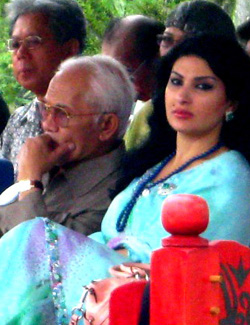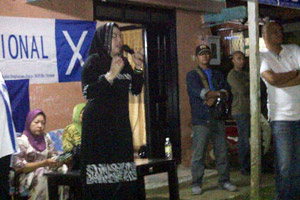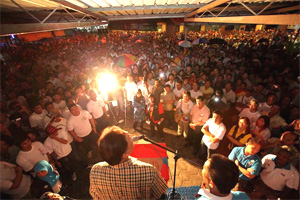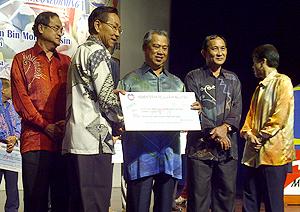ANALYSIS Three days before the state polls, Sarawak BN looks likely to retain its two-thirds majority in the 71-seat legislative assembly, even if it loses a few more seats to the opposition this time around.
According to an informed source, the number of safe seats for BN currently lies at 28, with 19 likely to be won by the opposition.
The outcome is too hard to call in the remaining 24 seats, the source said.
 Universiti Malaysia Sarawak senior lecturer and political scientist Jeniri Amir (
right
) also concluded that the opposition will win at least 19 seats come polling on April 16 - five seats short of denying BN its coveted two-thirds majority in the state assembly.
Universiti Malaysia Sarawak senior lecturer and political scientist Jeniri Amir (
right
) also concluded that the opposition will win at least 19 seats come polling on April 16 - five seats short of denying BN its coveted two-thirds majority in the state assembly.
Apart from 10 urban seats, Jeniri believes that 'black areas' for BN include the rural seats of Ba'Kelalan, Belaga, Pelagus, Beting Maro, Opar, Bengoh and Telang Usan.
Several BN sources feel that the coalition will lose only 15 seats, eight of these to the DAP.
Malay and Melanau voters will fall in behind BN as expected, but Chinese voters will back the opposition.
What remains to be seen is the response of Dayak voters, who make up 47 percent of the electorate. Both sides believe the opposition is making some inroads into this community.
In rural areas where BN has selected unpopular candidates or has been sabotaged by incumbents who have been dropped, or where people face contentious issues over dam construction and native customary rights to land, there is a good chance that seats will fall to the opposition.
 In urban areas, disenchantment over the long and allegedly corrupt rule of Chief Minister Abdul Taib Mahmud is obviously taking its toll on BN, and this has been compounded further by
Putrajaya's entry
into the campaign.
In urban areas, disenchantment over the long and allegedly corrupt rule of Chief Minister Abdul Taib Mahmud is obviously taking its toll on BN, and this has been compounded further by
Putrajaya's entry
into the campaign.
BN component Sarawak United People's Party (SUPP) is struggling to quell anti-Taib sentiments and has been forced to play the racial card - warning that the Chinese will lose their government representation if the party is wiped out.
SUPP stalwart and Bawang Assan incumbent Wong Sooh Koh told his Chinese constituents at a ceramah : "Soon Koh may lose but Pek Moh (Taib) will never lose... unless Taib (himself) wants to step down, it will be impossible for him to (leave).”
Eyes on CM
In the Malay and Melanau areas, which are contested by PKR and PAS, Taib’s insistence on clinging to power is taking centre stage in the opposition campaign, which has exhausted issues of native customary rights to land and poor infrastructure development.
"Now the main issue is Taib. Najib has given the signal but it looks like Taib still does not understand that he needs to go now," said Sarawak PAS secretary Fidzuan Zaidi when contacted.
Although these areas are PBB's traditional fortress, BN does not want to give the opposition any chance of achieving a breakthrough.
 It has imported Umno's ‘nasty’ machinery from the peninsula to assist its campaign in the Malay-majority area. Star speakers such as Ezam Mohd Noor and
Umi Hafilda Ali
have spoken at BN
ceramah
, zooming in on PKR
de facto
leader Anwar Ibrahim's alleged scandals and raising sentiments of
Ketuanan Melayu
.
It has imported Umno's ‘nasty’ machinery from the peninsula to assist its campaign in the Malay-majority area. Star speakers such as Ezam Mohd Noor and
Umi Hafilda Ali
have spoken at BN
ceramah
, zooming in on PKR
de facto
leader Anwar Ibrahim's alleged scandals and raising sentiments of
Ketuanan Melayu
.
The notion that Sarawak PKR chief Baru Bian, a Christian from the Lun Bawang community, may become the next chief minister - if Pakatan takes over Petrajaya - has been exploited by the BN to intimidate Malay and Melanau voters who are said to have enjoyed privileges in the civil service as well as to government aid under the administration led by Taib, a Melanau Muslim.
Playing on this, though, Pakatan campaigners have similarly been pointing out the privileges accorded to Malays and Melanaus, leaving the Ibans disgruntled.
Pakatan campaign
In the interior Iban longhouses - which hold the key if Pakatan is to deny BN's two-third majority - the opposition is fighting both geographical hurdles and its own limited resources to reach out to the electorate.
They can only adopt a 'touch and go' approach because the 10-day campaign period does not allow them to cover all the longhouses, most of which are located in the interior and only accessible by 4WD or boat.
Unlike urban seats, where the campaign is more dynamic with voters picking up information at the nightly ceramah and via the media, those in rural seat are only exposed to the mainstream media. As such, they are oblivious to the latest developments.
 "We can only visit most of the longhouses once throughout the campaign period," said a DAP canvasser in Simanggang.
"We can only visit most of the longhouses once throughout the campaign period," said a DAP canvasser in Simanggang.
One option for the opposition is to focus on voters who have family relationships or close friendships with its candidates.
Due to poor political awareness among native communities, however, the opposition has to spend much time explaining simple political facts to give credence to its campaign. This includes informing them about the 2008 ‘political tsunami’ across the waters, and that there are more Pakatan MPs than PBB and SUPP combined.
It has had help from an unexpected quarter. In an unprecedented move, several pastors resigned office to campaign full-time for the opposition, prompted by the handling of the Al Kitab impoundment and ban on non-Muslim use of the word ‘Allah’.
Issues linked to religious freedom are not likely to resonate in the interior areas, as rural voters are more concerned about bread-and-butter issues.
Pakatan has observed a significant change in attitude within the Iban community.
"I was told that Ibans did not dare put up opposition posters in their longhouses in the past. But now we can see posters of opposition candidates pasted on the pintu next to the that of the tuai rumah (longhouse head). They also dare to allow us to visit them now," said DAP’s Jelutong MP Jeff Ooi who campaigned in Simanggang, a Iban-majority rural seat.
Still, campaigners from PKR and DAP told Malaysiakini that Iban voters are highly unpredictable and can be easily swayed by BN's last-minute money politics .
'Carpet-bombing' anticipated
Jeniri shared the view, adding that BN propoaganda has been embedded in the mindset of native communities over the past four decades.
 "Anything can happen in the last few days (of campaigning). BN has a strategy of ‘carpet-bombing’ rural areas with goodies and instant projects. (This has proven effective on native communities)," he said when contacted today.
"Anything can happen in the last few days (of campaigning). BN has a strategy of ‘carpet-bombing’ rural areas with goodies and instant projects. (This has proven effective on native communities)," he said when contacted today.
Jeniri also noted that Najib has started his six-day statewide visit to different ethnic communities.
"This is to convey the message that he is trying to address their problems. The prime minister is a very ‘selling’ brand that resonates well with the people," he said.
Based on past experience, support for the BN will jump in the final lap of campaign due to these factors, he noted.
"(There’s) nothing much the opposition can do here. Their grassroots machinery is not effective, (and they have) limited resources."
Some observers have pointed out that it is necessary for Najib to visit the voters personally, providing guarantees of quick solutions to local issues because the people have lost confidence in the empty promises of state leaders and BN representatives.
"As he is the nation's top leader, people have more confidence in him. This approach will deal with voters who are more concerned about local problems than national issues or Taib," said an observer.
Another important factor is the amount of effort put into the constituency by the opposition over the past five years and whether the candidate is well known among voters.
As the Chinese saying goes, ‘the more ploughing and weeding, the better the crop’.

